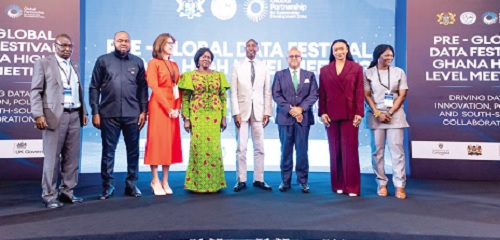The Vice-President, Professor Naana Jane Opoku-Agyemang, has reaffirmed the government’s commitment to leverage data for inclusive development, sustainable governance and global collaboration.
“The role of data in development, governance and global co-operation has never been more consequential. In a world of uncertainty, data remain a powerful tool for making informed decisions,” she said.
Speaking at a Pre-global data festival Ghana high-level meeting in Accra yesterday, Prof. Opoku-Agyemang said the country’s governance model was now anchored on evidence-informed policies intended to drive economic resilience and inclusive progress.
She emphasised that policy must be informed by facts, shaped by reality, and designed for inclusive impact to achieve the country’s objectives.
“That is why we have mainstreamed data stewardship and evidence use across ministries, departments and agencies,” she said.
The event, which was on the theme: “Driving data innovation, policy and South–South collaborations”, was co-hosted by the Ghana Statistical Service (GSS) and the Global Partnership for Sustainable Development Data.
There would be sessions on data governance, innovation and the role of the youth in building inclusive and resilient data ecosystems.
It is a stepping stone towards the 2026 Global Data Festival in Nairobi.
There would also be a showcase of innovations and strategic partnerships, among others.
Economic recovery
Highlighting the country’s recent macroeconomic development, Prof. Opoku-Agyemang said Ghana had recorded a 5.3 per cent GDP growth in the first quarter of 2025, and a drop in inflation to 12.1 per cent in July, resulting in a narrower fiscal deficit target.
She said the government was building on “a foundation of a resilient and dynamic economy, and these indicators are a positive signal of recovery and discipline”.
The Vice-President also underscored the transformative role of data across sectors such as health, agriculture, climate resilience and the blue economy.
“From real-time land-use planning and weather-resilient seed systems to satellite monitoring of forests and coastlines, data-driven innovations are informing smarter and more sustainable policy decisions,” she added.
Prof. Opoku-Agyemang commended the GSS for its agility and leadership in driving the data revolution, adding that its evolution from rapid pandemic response surveys to fostering global partnerships that strengthened the country’s statistical ecosystem had been an impressive journey.
Looking ahead to the 2026 Global Data Festival in Nairobi, Prof. Opoku-Agyemang emphasised the country’s readiness to showcase advancements such as tax data modernisation, mobile data use in official statistics, disaster risk reduction planning and innovations in data science and machine learning.
Impact of data
The Government Statistician, Dr Alhassan Iddrisu, said that the GSS had worked to institutionalise data stewardship across governments, making data not the business of one office but a shared responsibility across ministries, departments and agencies.
He said over the past year, the GSS had formalised 26 data-sharing MoUs with government institutions, pioneering inclusive data through citizen-generated approaches, built a national statistics and policy observatory, and a national data science roadmap, among other programmes.
Dr Alhassan said the initiatives were guided by a power of data action plan and a soon-to-be-launched national strategy for the development of statistics (NSDS) round 3, both of which had embedded data at the core of the national planning processes.
He further said that Ghana’s leadership in data reform had inspired countries such as Sierra Leone, Togo and Botswana to adopt similar strategies.
For her part, the Chief Executive Officer of Global Partnership Sustainable Development Data, Dr Claire Melamed, commended Ghana’s consistent efforts to integrate evidence-driven approaches into governance, adding that such leadership had turned the country into a beacon for others seeking to harness data for policy and innovation.

